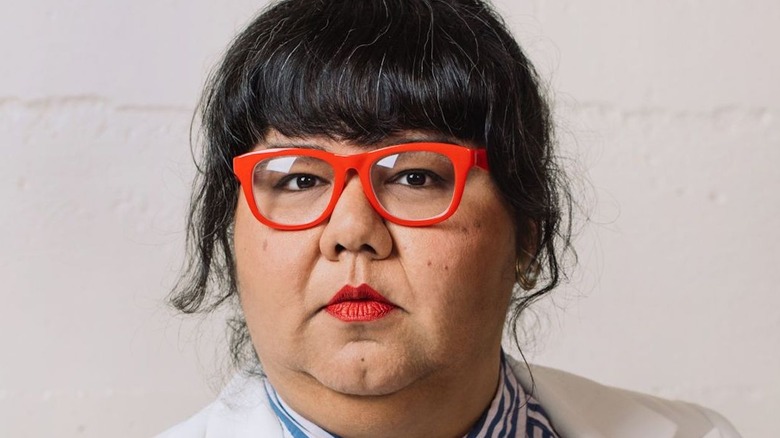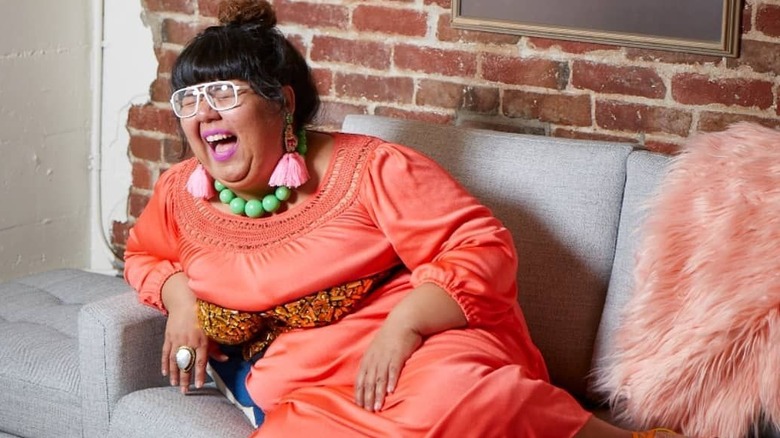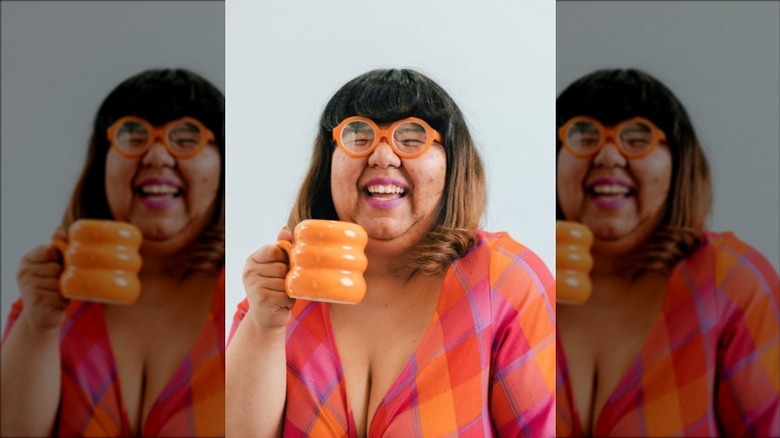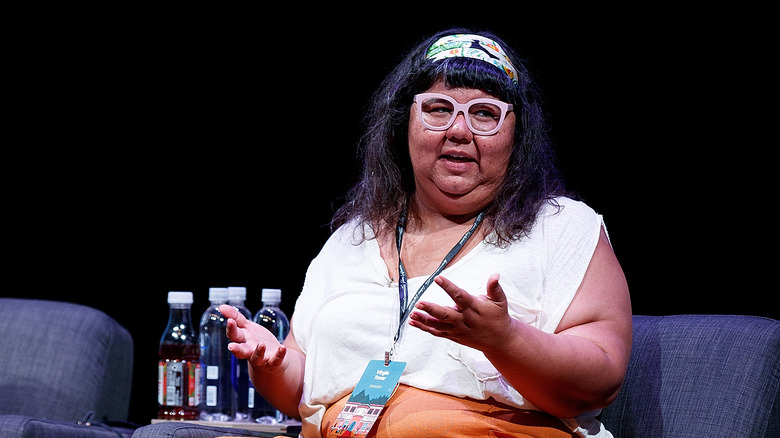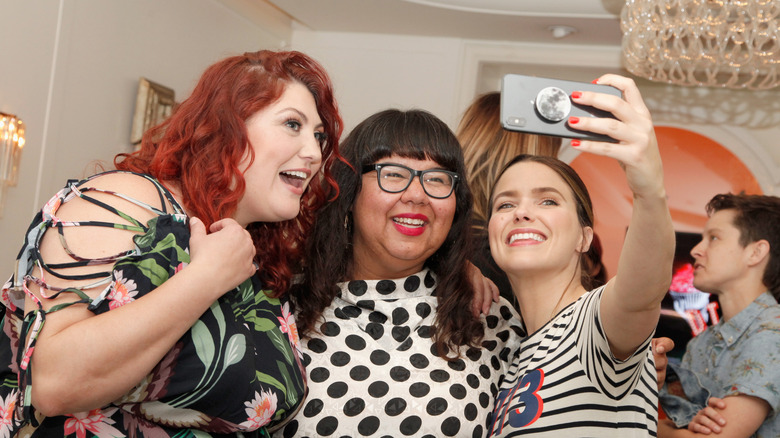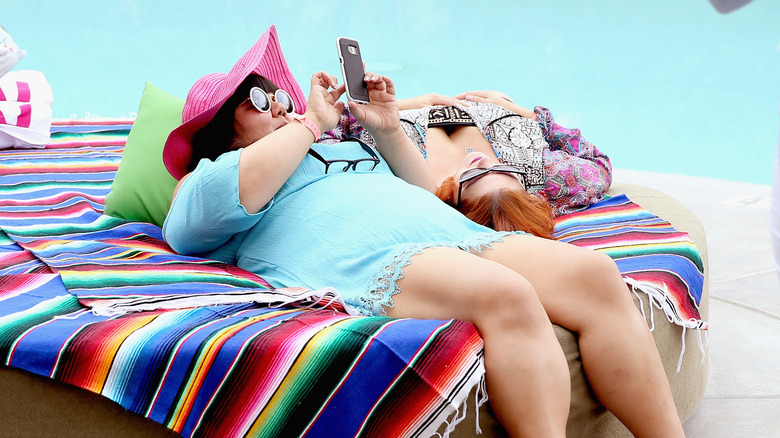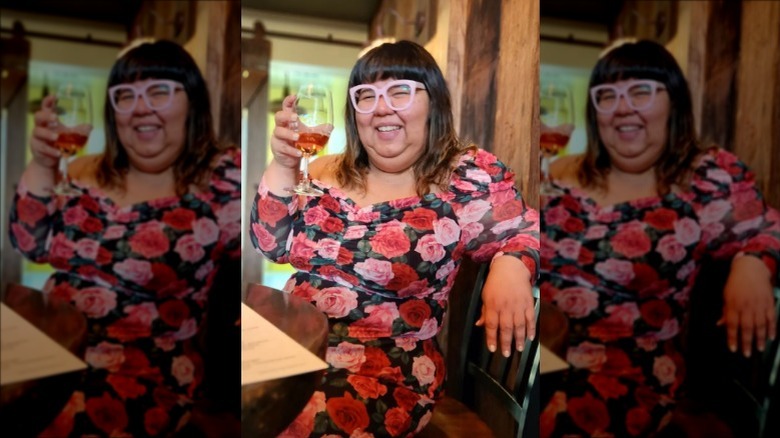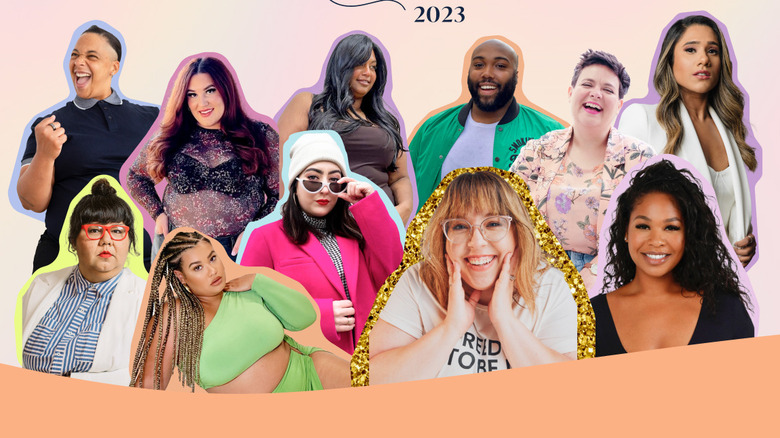Virgie Tovar On Body Acceptance And Dismantling Weight-Based Discrimination - Exclusive Interview
Virgie Tovar is an author and activist against weight-based discrimination. She has published books, including "You Have the Right to Remain Fat," "The Self-Love Revolution: Radical Body Positivity for Girls of Color," and "The Body Positive Journal"; she's also a frequent contributor to Forbes, where she writes about the plus-size market and ending weight discrimination in the workplace. This year, Tovar will be participating in the third annual BodCon — a virtual confidence promoting body positivity and self-love. At the conference, Tovar will be leading a guided journaling session, as she believes journaling can be a good step in learning to accept and appreciate yourself.
During an exclusive interview with The List, Tovar opened up about her experience with bullying, how that affected her self-worth, and how she overcame that through body acceptance. She also shared her thoughts on weight-based discrimination and what she believes are the next steps to fighting against it.
How Virgie started her body acceptance journey
What first empowered you to start writing about body acceptance?
I have always been in a bigger body. As a child, I was not introduced to fatphobia at home. I was introduced to fatphobia at school. From age 5 to about age 18, I was bullied brutally. I don't even call it bullying — I call it abuse, because on the one hand, we recognize that bullying has these long-term effects, but saying "bullying" doesn't encapsulate what happened to me.
I learned to hate my body. I saw my body as the reason that people abused me. I thought that if I could make it the right size [that I could change that]. I felt like everyone wanted me to be thin, and they were willing to do and say whatever they had to do to make me become a thin person, so I kept trying. I developed an eating disorder. I was obsessively exercising. My body size changed, but it never became the social normative of thin.
I ended up discovering fat activism when I was almost 30 years old in graduate school. It completely changed my life. They were like, "Nothing is wrong with you. What if you accepted that nothing was wrong with you, that you don't have to diet, that you don't have to manipulate food in order to have a certain body type because there's nothing wrong with being fat?" That message completely changed my life and set me on a path of healing that was so inspiring that I wanted to share it with other people.
If you need help with an eating disorder, or know someone who does, help is available. Visit the National Eating Disorders Association website or contact NEDA's Live Helpline at 1-800-931-2237. You can also receive 24/7 Crisis Support via text (send NEDA to 741-741).
Negative health impacts of body dissatisfaction
How do you feel body acceptance can impact someone's life?
So many ways — I want to start even with my own life. The first thought every day of my life for most of my life was I would wake up and think, "I can't believe I still have this body. I hate this body." Frankly, I know a lot of people start their day with that feeling. If you can imagine the pain and suffering that's involved with that being your number one go-to emotion and thought all day, every day ... Again, [for] a lot of people, even if their body dissatisfaction or body dysmorphia isn't that acute, body dissatisfaction in general leads to negative outcomes, period.
We know that, for example, dieting chronically leads to mental and physiological stress. We know that people who are dissatisfied with their bodies are more likely to opt out of important life moments. We know people who don't like their bodies don't allow themselves to be documented at the same rate as people who do. Even thinking about that ... What does it mean that an entire fat person's life — or for dozens or hundreds or thousands of people who have body dissatisfaction — that they're not in the record? They're not in anyone's photo album. They're not on anyone's Instagram. I think about things like that. What does that mean to be erased? That's really what that is.
We know that leads to those kinds of outcomes. It leads to poorer sexual decision-making. It leads to you making worse boundary decisions. When you work through body acceptance, you begin to be able to change some of those outcomes. Those are really important for a person's sense of dignity, their ability to thrive, and their ability to feel like they're fully human.
Viewing weight discrimination as a human rights issue
You write a lot about weight-based discrimination, particularly in the workplace. Do you feel like you've seen that issue improve or change at all since you started this work?
Well, when I started this work, I never had corporate clients. I did not have clients who were approaching me and saying, "How do we end weight discrimination? How do we make a more accessible workplace? Can we do literally an audit of the design of our office to make it more accessible to people in larger bodies?" Now, most of the clients who approach me are corporate clients. The awareness of this issue has gone through the roof from when I started doing this work.
When I started doing this work, the only groups of people who knew about it were the activists, the political people who were doing the work, and then academia, who was interested in it from a justice perspective, but specifically from a scholarly perspective. Those are the only people who were hiring me and who I saw having any interest in this issue.
What do you feel are still the biggest obstacles to dismantling weight-based discrimination?
The biggest one is the misunderstanding that this is a health issue and not a human rights issue. People get caught up in the concern or the rhetoric that being in a larger body is inherently unhealthy, which ... There's enough science that says that isn't true, but our culture believes that it is.
When you look at the argument for why weight discrimination is a human rights issue, it's very strong. When you look at the data on how people in larger bodies get treated, it's in line with any other type of discrimination. People in larger bodies make less money, are less likely to be hired, are less likely to be promoted. They're less likely to receive preventive medical care than people in thin bodies. They're more likely to experience romantic discrimination. They're less likely to be able to find clothing in their size.
There's a huge case to be made about why this is a human rights issue. People get stuck in, "If I am supporting this human rights issue, am I ignoring science? Am I ignoring what doctors say?" It's important to understand that the current medical position is not based in science. This is something that more and more people are proving. Anyway, it's a very long answer, but that's the most important thing that people understand. What we need to be focused on is: "Does everyone, regardless of their body size, have the same access to a meaningful life?" Right now, that is not available for many, many Americans who are in larger bodies.
Being the first Poynter Fellow in a crop top
You've written books. You've written for different magazines. You've done a lot of projects. Is there anything in your career that you feel like you're most proud of at this point?
One that comes to mind [is] when I got approached by Yale. They wanted to offer me the Poynter Fellowship in Journalism. They brought me to Yale. I spent a week there, and I spoke to their students and got to live briefly in the visiting scholar corners of this super old institution. It was incredible.
They gave me an award, which included a picture of me. They were like, "Virgie Tovar, you're the first honoree to ever wear a crop top to the ceremony." It was so funny. It was a little bit cheeky, but they were like, "Thank you for your work in diet culture and fatphobia and all your advocacy work and all your writing. You're the first person in our Hall of Poynter Fellows who's wearing a crop top." It was both of that, where it's like, "Whoa, I'm getting honored by this super prestigious institution, but I'm also just being me." I'm not wearing a button-down. I'm wearing a crop top, and I've got a flawless belt and a cheetah-print coat.
Virgie's BodCon workshop
You're also doing BodCon this year. What made you want to get involved in that event?
I love doing anything related to ... There's a lot of different words for body confidence, which is what the BodCon is about. Body acceptance, body love — all of that is my wheelhouse. I love, love, love helping in any way that I can. I've worked in this arena for almost 15 years now, and I've developed a lot of tools about how to deal with a culture that's constantly bombarding us with toxic messages. I feel a fire in my belly about sharing those tools and teaching people how to use them.
I'm always excited for an opportunity to be able to do that. I feel like the BodCon is such a well-organized, vibrant platform, so it's exciting to be able to bring my message to that space.
You're doing a journaling session at the event. Why do you think journaling is an important tool for people?
I have a new journal out. It's called "The Body Positive Journal." I wrote that book because of the role that journaling played in my own life and the role that journaling played in my body acceptance journey. There are so many things we learn from journaling. To begin with, it's a document of our innermost selves. When we put it to the page, we are saying, "I deserve to exist. I deserve to have these feelings. I deserve to have a document of my inner processes," which is such an important self-love and self-care thing.
Journaling as a way to recognize growth
Virgie Tovar [continued]: The other things I love about [journaling is that] it shows you ... Because we're on a journey, we often don't realize when we've had big success moments. A journal helps us realize that. For example, when I looked at my journal from January to December of a year, I might have started January with this one thought that I couldn't get rid of. I might see it in January, February, March, and then all of a sudden, it will disappear. I won't have even noticed it. I'm like, "Oh, my God!"
I remember an "aha" moment for me that I had that made me realize why journaling was so important. One day, I remember, after years and years and years ... Again, I had an eating disorder. I didn't allow myself to shop in most of the aisles of the grocery store. I would only stick to four aisles. I never let myself go anywhere near the refrigerated dessert area. After years of that being something that I did, even after I stopped dieting, I still didn't feel comfortable doing it.
One day, it wasn't an issue anymore. I walked up to the refrigerated dessert section, and I was not spiraling. It was this incredible moment of like, "Oh, my God." I could sense that a colossal thing had happened, and I [almost] hadn't noticed it. It was this incredible thing to be able to go home and write about it and be like, "This is huge," and to celebrate myself. When you're on a healing journey, celebrating yourself is actually a therapeutic tool. It's part of cognitive behavioral therapy. There's a therapy argument for some of this, too.
The other reason that's a little bit more "woo woo," or a little bit more metaphorical — and I talk about this in ["The Body Positive Journal"] — [is] that I love the relationship that I have to the blank page and that any journaler can have to the blank page. It's a metaphor for a blank slate. You can have all these days before, where you felt this way, and then you can turn the page one day and that isn't the truth. It shows us how we can create the life that we want. The power of the blank page is that you can fill it with anything that you want. A lot of times, we think that page is already being written for us, and I love that power of, "No, that's not the case." Journaling teaches us that.
Virgie's top advice for writers
What would you say is your biggest piece of advice to new writers?
Oh, my goodness ... I'm going to share a piece of advice that was given to me by another writer that really changed how I wrote. It was to understand that there are two fundamental roles in writing. There's the creator, and there's the custodian — [or] it's the creator and the editor. He said, "They should never be in the room at the same time." The creator should go in — I always have the metaphor of a little kid in a bedroom. I think of our inner creative as that child. You need to give that child a crayon, you need to lead that child into a bedroom with all these blank walls, and you close the door and leave that kid alone until they come out on their own.
Then you look at all that they've created. Then the editor, or the janitor or whatever, can come in and be like, "This idea is good. This idea is underdeveloped. This idea has got to go. This is for another project." But to not have those two people and energies in the room at the same time is essential. For journalists, it's almost impossible not to have the editor in our head all of the time as we're writing. But if you can, separate the creative side of writing from the disciplinary side of writing as much as possible.
Tickets are now on sale for the highly-anticipated, third-annual virtual body confidence conference, The BodCon 2023, taking place Sunday, March 5, 2023 from 11:00 a.m. – 6:35 p.m. ET. Its sister podcast, The BodPod, is a weekly podcast that dives deep into the people, brands, and topics that are making a difference in the way we view our bodies.
This interview has been edited for clarity.
